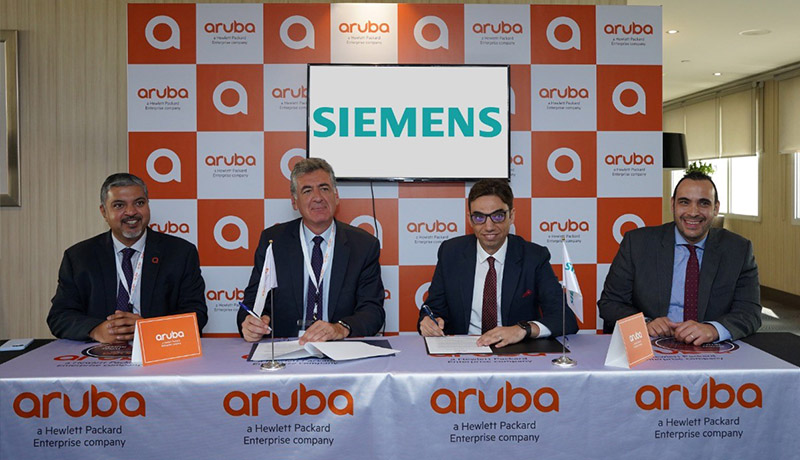
Aruba, a Hewlett Packard Enterprise company, and Siemens, a technology company focused on the digital transformation of industry and infrastructure, announced a strategic partnership in the UAE, focused on bridging the Operational Technology (OT) and Information Technology (IT) worlds.
Siemens and Aruba can support customers with highly dependable, secure, and insightful data networks, providing high plant and network availability, based on the complementing portfolios. Based on Siemens’ experience as a leading supplier of industrial Ethernet network components and Aruba’s knowledge as a leader in wired and wireless LAN infrastructure, customers benefit from integrated networks with proven interoperability from factory floors to corporate offices.
Jacob Chacko, Regional Director – Middle East, Saudi & South Africa at Aruba said “The ‘UAE Industry 4.0’ initiative announced by the country’s Ministry of Industry and Advanced Technology places UAE at the heart of the global Fourth Industrial Revolution. As a company, Aruba is very keen to support the government’s vision, and found in Siemens is the ideal partner that can help drive innovation and digital transformation in the industrial segment.”
He added “Siemens brings over 30 years of experience in the fields of OT communication technology, with services and infrastructure that can be customized and scaled to meet the needs of a wide range of industrial and manufacturing customers. As one of the world’s largest IT networking companies, Aruba brings unparalleled experience in high-reliability, secure mobility, LAN switching, SD branch, locationing, application assurance and network management systems. Working in collaboration, Siemens and Aruba can together deliver the most secure, resilient and insightful integrated OT and IT systems available.”
New challenges are being raised by digitization, industry 4.0 and industrial IoT as data now needs to traverse between the boundary separating OT and IT. Usually, industrial OT networks are not coupled tightly with enterprise IT networks. This results in gaps in data and device visibility, application assurance, availability, and security.
A deep understanding of both areas and familiarity with the corresponding operational and security needs are needed to bridge this gap. While plant availability and manufacturing production targets are more crucial in the OT world than they are in the IT world, cybersecurity and reliable data are both high considerations. Based on their extensive and complementary OT and IT knowledge, Siemens and Aruba bridge this gap.
The two companies have taken the guesswork out of OT/ IT deployments by validating interoperable operations across products and documenting reference designs. As a result, systems go in faster and work more reliably. The integrated solutions include wired and wireless networking products and related software that can be implemented via several channels, including the companies’ extensive partner networks with direct access to their engineering and support experts.
Both companies can address customer requirements covering pre-sales consulting and engineering, professional services, manage operation and maintenance services and after-sales support. They have created an engineer-to-engineer escalation program so the best technical resources are available 24/7.
This helps to make sure network security is bridged over both the worlds of IT and OT. This concept can be better understood by looking at examples like Aruba’s 360 Secure Fabric for IT networks can be combined with Siemens’ “Defense in Depth” OT security concept. The companies can address to customer specific requirements and customize security accordingly
Mohammed Khalifa, the CEO of Siemens Digital Industries in the Middle East said “The cooperation between Siemens and Aruba is an important step to enhance our industrial networks portfolio with the additional IT solution offering from Aruba – forming a strong platform for the Digital Enterprise. Together we provide IoT visibility and cybersecurity from Infrastructure/ Operations teams to CEOs for manufacturing, industrial, transportation, defence, and electrical power applications. Customers will benefit from future-proof, integrated communication networks, ensuring high availability and security.”